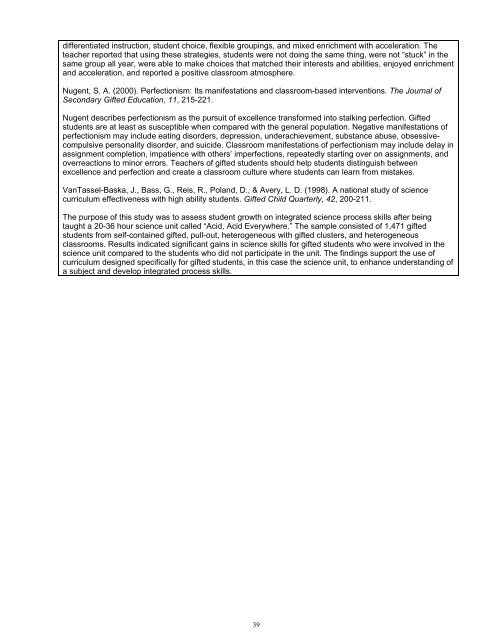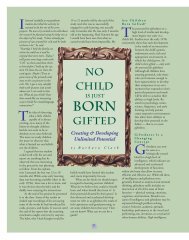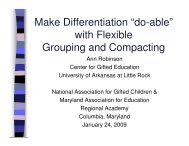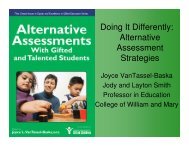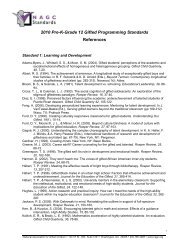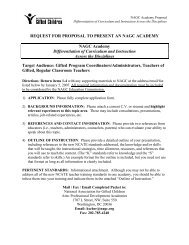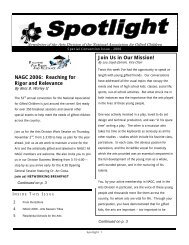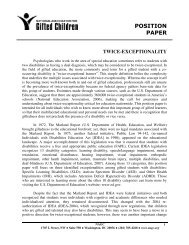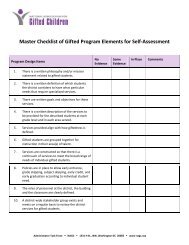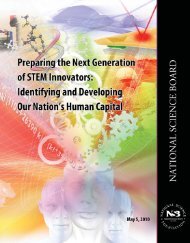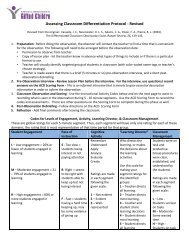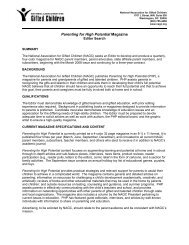McLaughlin, S. C., & Saccuzzo, D. P. (1997) Ethnic and gender differences in locus of control in childrenreferred for gifted programs: The effects of vulnerability factors. Journal for the Education of the Gifted, 20,268-284.This study investigated gifted and non-gifted students and the correlation among ethnicity, gender,vulnerability factors, and locus of control (the relationship between one's behavior and the outcome of thoseactions). Over 800 fifth through seventh grade students with diverse backgrounds and characteristics wereevaluated for intellectual ability, vulnerability factors, and locus of control. The results showed a significantrelationship between ethnicity and vulnerability. In addition, a higher internal locus of control was associatedwith not at risk, female, Caucasian students. The authors believed the findings lead to two conclusions. Thereis more internal locus of control in gifted children. Gifted minority students' vulnerability is associated with agreater internal locus of control.Robinson, A., & Clinkenbeard, P. R. (1998). Giftedness: An exceptionality examined. Annual Review ofPsychology, 49, 117-139.Gifted students tend to be more internally motivated and have positive attributions for their success andfailure. Other motivational factors from previous studies included a strong locus of control, high effort, no testanxiety, less concern with peer pressure, strong extracurricular intellectual or creative interest, advanced andindependent study, and relating school success to personal goals.Practice-based ReferencesDavalos, R., & Griffin, G. (1999). The impact of teachers’ individualized practices on gifted students in rural,heterogeneous classrooms. Roeper Review, 21(4), 308-314.In this study, the researchers spent more than 350 hours observing teachers while they were being trained toindividualize instruction and during the implementation of training goals. The results indicated that giftedstudents might be served in a heterogeneous classroom if the classroom teacher (a) understands its benefitsand is highly motivated to use individualization as an instructional technique, (b) is willing to give control overlearning to the students themselves, (c) understands academic, social, and emotional needs of giftedlearners and is prepared to support those needs, and (d) receives proper training in individualizationtechniques.Friedman, R. C., & Lee, S. W. (1996). Differentiating instruction for high-achieving/gifted children in regularclassrooms: A field test of three gifted-education models. Journal for the Education of the Gifted, 19, 405-436.This study examined three instructional models: the Enrichment Triad Model (Renzulli & Reis, 1986), theMultiple Talent Model (Taylor, 1986), and the Cognitive-Affective Interaction Model (Williams, 1986). Thesemodels were field-tested in inclusive, general-education classrooms in rural, low-income, and/or ethnicallydiverse communities. Using a multiple-baseline-across-settings design, the researchers interviewed theparticipants and observed in teachers’ classrooms. They found that a strong positive relationship existedbetween teacher questions and student responses--the higher cognitive level of the teacher question elicitedhigher cognitive levels of student responses. The students in classrooms using the Cognitive-AffectiveInteraction Model demonstrated the greatest gains in higher cognitive levels.Gentry, M., & Owen, S. V. (1999). An investigation of the effects of total school flexible cluster grouping onidentification, achievement, and classroom practices. Gifted Child Quarterly, 43, 224-243.The study examined the use of cluster grouping during a four-year period in a small, rural school district. Thecomparison sample involved students who had not been involved in cluster grouping in a demographicallysimilar school. While the students in the treatment schools outperformed the comparison groups in readingand math. In addition, teachers created challenge through integrating high order thinking skills, developingcritical thinking skills, using creative thinking skills, integrating problem solving, assigning projects, usingacceleration, and adjusting assignments.Hughes, L. (1999). Action research and practical inquiry: How can I meet the needs of the high-ability studentwithin my regular education classroom? Journal for the Education of the Gifted, 22, 282-297.Using data collected from student questionnaires, parent interviews, classroom observations, and teacherstudentportfolio conferences, this fourth-grade-teacher-identified activities for her high-ability students:38
differentiated instruction, student choice, flexible groupings, and mixed enrichment with acceleration. Theteacher reported that using these strategies, students were not doing the same thing, were not “stuck” in thesame group all year, were able to make choices that matched their interests and abilities, enjoyed enrichmentand acceleration, and reported a positive classroom atmosphere.Nugent, S. A. (2000). Perfectionism: Its manifestations and classroom-based interventions. The Journal ofSecondary Gifted Education, 11, 215-221.Nugent describes perfectionism as the pursuit of excellence transformed into stalking perfection. Giftedstudents are at least as susceptible when compared with the general population. Negative manifestations ofperfectionism may include eating disorders, depression, underachievement, substance abuse, obsessivecompulsivepersonality disorder, and suicide. Classroom manifestations of perfectionism may include delay inassignment completion, impatience with others’ imperfections, repeatedly starting over on assignments, andoverreactions to minor errors. Teachers of gifted students should help students distinguish betweenexcellence and perfection and create a classroom culture where students can learn from mistakes.VanTassel-Baska, J., Bass, G., Reis, R., Poland, D., & Avery, L. D. (1998). A national study of sciencecurriculum effectiveness with high ability students. Gifted Child Quarterly, 42, 200-211.The purpose of this study was to assess student growth on integrated science process skills after beingtaught a 20-36 hour science unit called “Acid, Acid Everywhere.” The sample consisted of 1,471 giftedstudents from self-contained gifted, pull-out, heterogeneous with gifted clusters, and heterogeneousclassrooms. Results indicated significant gains in science skills for gifted students who were involved in thescience unit compared to the students who did not participate in the unit. The findings support the use ofcurriculum designed specifically for gifted students, in this case the science unit, to enhance understanding ofa subject and develop integrated process skills.39
- Page 3 and 4: This book provides a survey of fede
- Page 5 and 6: Castellano, J. A. (1998). Identifyi
- Page 7 and 8: U.S. Department of Education. (1993
- Page 9 and 10: This qualitative investigation expl
- Page 11 and 12: four as “unsuccessful.” A child
- Page 13 and 14: from a comparison school district.
- Page 15 and 16: Cross and Coleman, Feldhusen, Gagn
- Page 17 and 18: Books, and Talents Unlimited. Teach
- Page 19 and 20: Kitano, M. K. (2003). What’s miss
- Page 21 and 22: Russo, C. J., & Ford, D. Y. (1993).
- Page 23 and 24: CEC Knowledge/Skills Evidence-BaseR
- Page 25 and 26: Piechowski, M. M. (1992). Giftednes
- Page 27 and 28: 14-18 in a competitive gifted progr
- Page 29 and 30: Many students of color are not perf
- Page 31 and 32: Bloom, B. S., & Sosniak, L. A. (198
- Page 33 and 34: the academic achievement of 273 ele
- Page 35 and 36: Silverman, L. K. (1997). The constr
- Page 37: Milbrath, C. (1998). Patterns of ar
- Page 41 and 42: condition. (adapted from the journa
- Page 43 and 44: Practice-based ReferencesCline, S.
- Page 45 and 46: Literature/Theory-based ReferencesB
- Page 47 and 48: This book focuses on ways teacher c
- Page 49 and 50: students; and compared the learning
- Page 51 and 52: Standard 3: Individual Learning Dif
- Page 53 and 54: This edited volume delineates couns
- Page 55 and 56: Literature/Theory-based ReferencesA
- Page 57 and 58: schools (one affluent community, on
- Page 59 and 60: Gagné’s Differentiated Model of
- Page 61 and 62: considerations in planning a sound
- Page 63 and 64: Stamps, L. (2004). The effectivenes
- Page 65 and 66: and menus.Standard 4: Instructional
- Page 67 and 68: determining the central purpose or
- Page 69 and 70: Swiatek, M. A. (1993). A decade of
- Page 71 and 72: applications and theoretical modeli
- Page 73 and 74: curricular dimensions that are resp
- Page 75 and 76: Standard 4: Instructional Strategie
- Page 77 and 78: CEC Knowledge/Skills Evidence-BaseR
- Page 79 and 80: Perry, T., Steele, C. & Hilliard, A
- Page 81 and 82: competence and superior adjustment
- Page 83 and 84: challenging and provocative arena.
- Page 85 and 86: the influence of verbal skills on p
- Page 87 and 88: perceived as positive. (ERIC abstra
- Page 89 and 90:
Christophersen, E., & Mortweet, S.
- Page 91 and 92:
Standard 5: Learning Environments a
- Page 93 and 94:
practical advice for all classroom
- Page 95 and 96:
Kerr, B., & Cohn, S. (2001). Smart
- Page 97 and 98:
CEC Knowledge/Skills Evidence-BaseR
- Page 99 and 100:
Standard 6: Language and Communicat
- Page 101 and 102:
Practice-based ReferencesGavin, M.
- Page 103 and 104:
This article focuses on recommended
- Page 105 and 106:
This study was designed to measure
- Page 107 and 108:
Standard 6: Language and Communicat
- Page 109 and 110:
The authors conclude that more targ
- Page 111 and 112:
Standard 6: Language and Communicat
- Page 113 and 114:
Standard 7: Instructional PlanningG
- Page 115 and 116:
The four parallel approaches to cur
- Page 117 and 118:
suggested curriculum or supplementa
- Page 119 and 120:
Part of the Gifted Treasury Series,
- Page 121 and 122:
Prufrock Press.This teacher-friendl
- Page 123 and 124:
introductory chapter, individual ch
- Page 125 and 126:
all individuals and it improves sel
- Page 127 and 128:
Both of these books outline how to
- Page 129 and 130:
Standard 8: AssessmentGifts and Tal
- Page 131 and 132:
Thousand Oaks, CA: Corwin Press.The
- Page 133 and 134:
contribution of dynamic assessment
- Page 135 and 136:
School District's advocacy efforts.
- Page 137 and 138:
students not using the unit.Literat
- Page 139 and 140:
identification of more economically
- Page 141 and 142:
Standard 8: AssessmentGT8S2Use tech
- Page 143 and 144:
eviews the literature related to pr
- Page 145 and 146:
Practice-based ReferencesCallahan,
- Page 147 and 148:
CEC Knowledge/Skills Evidence-BaseR
- Page 149 and 150:
Standard 9: Professional and Ethica
- Page 151 and 152:
Standard 9: Professional and Ethica
- Page 153 and 154:
excellence and equity in education.
- Page 155 and 156:
culturally diverse students. Journa
- Page 157 and 158:
Standard 9: Professional and Ethica
- Page 159 and 160:
elated to giftedness and the prepar
- Page 161 and 162:
Americans (n=580). Approximately 50
- Page 163 and 164:
Standard 10: CollaborationGifts and
- Page 165 and 166:
Sixty-three Latina women (43 doctor
- Page 167 and 168:
Standard 10: CollaborationGT10S1Res
- Page 169 and 170:
associations, burnout, and resource
- Page 171 and 172:
activities with insects and arthrop
- Page 173 and 174:
“kids can make a difference!”St
- Page 175 and 176:
Rash, P. K. (1998). Meeting parents
- Page 177 and 178:
Standard 10: CollaborationGT10S4Col
- Page 179 and 180:
the interface with general educatio
- Page 181 and 182:
for gifted Hispanic LEP students an
- Page 183 and 184:
student portfolios, the Torrance Te
- Page 185:
Parker, J. (1996). NAGC standards f


